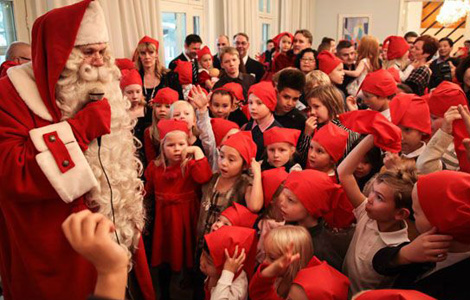NBA is leagues ahead in sports promotion game
Updated: 2013-12-11 07:06
By Shen Jingting (China Daily USA)
|
||||||||
US-based sports organization has gone from one success to another in China, surprising industry observers, as Shen Jingting reports
It was a harsh winter in 1987 when David Stern, the commissioner of the United States-based National Basketball Association, flew to Beijing to ask State broadcaster China Central Television to air video clips of basketball games.
Stern promised to offer content for free, as long as CCTV agreed to open a window to the many Chinese viewers who hadn't previously enjoyed watching professional basketball competitions.
Since then, the NBA has gone from one success to another in China, astonishing many industry observers and even Stern himself. China has become the NBA's biggest overseas market, with more than 300 million basketball fans and followers.
Now, the association is aiming to turn its basket of businesses into real money.
David Shoemaker, chief executive officer of NBA China, said the company has achieved double-digit growth every year since it was established in 2008.
"We believe NBA China will maintain that momentum in the foreseeable future," said Shoemaker, in an interview with China Daily.
The NBA's expansion in the Chinese market has yet to hit a ceiling. Stern is set to step down as NBA commissioner in February, but he said that the association's development in China won't slow down after his departure.
The legendary sports leader said that he's satisfied with the NBA's achievements in China over the past 26 years. However, there is always room for NBA to grow in the country.
"We need to further increase the popularity of our game and bring its values to Chinese fans," Stern said during his latest trip to Beijing in October.
The league has sensed a new gold mine in China's huge mobile population. China has more than 1.2 billion mobile subscribers, and it's emerged as the world's biggest smartphone market.
"It's not a crisis but an opportunity as more young people turn to the digital and mobile world," Stern said. If the NBA jumps on the mobile bandwagon, the league is likely to attract more young fans and broaden its audience in China, he added.
Web games
Many recent moves have demonstrated the NBA's determination to conquer this market. NBA China has renewed its partnerships with Chinese Internet giants Sina Corp and Tencent Holdings Ltd. These alliances will help NBA game content reach a broader viewer base.
Sina has a Web page for each of the 30 NBA teams. The company has also held online sessions with Chinese NBA fans.
For its part, NBA China opened official accounts on Sina Weibo, the micro blog platform, and WeChat, a mobile chatting tool developed by Tencent. It has more than 25 million fans and followers on Sina Weibo so far.
Another way for NBA China to venture into the mobile market is to cooperate with handset manufacturers. China is a global manufacturing base for smartphones, and the country boasts many top-level mobile phone vendors such as Lenovo Group Ltd and Huawei Technologies Co Ltd.
In October, the NBA announced an alliance with the world's fourth-largest mobile phone producer, ZTE Corp, which is based in China's southern city of Shenzhen.
Under the agreement, NBA will embed tailored apps in ZTE smartphones and offer exclusive content to ZTE device users.
"The unique feature of NBA games in China is that they are, with rare exception, played in the morning," Shoemaker said. As a result, many people miss the games because they are on their way to work or school.
"I think the real opportunity for us is to get our content, whether it is live games, or highlight clips, or fun videos from the locker room, into the hands of our fans who are holding mobile handsets and tablets," Shoemaker added.
Stern said the NBA needs to put more resources into its own people so that it can take advantage of the opportunity presented by so many potential fans. A staff expansion plan is in the works.
"We have offices in Shanghai, Beijing and Hong Kong, but nothing in Harbin, or in the west, so there is an enormous opportunity. We just have to steadily grow our presence here and take advantage of that," Stern said.
NBA China now has about 130 staffers, with some 100 working at its Beijing headquarters.
In early November, NBA China held a groundbreaking ceremony for the world's first flagship NBA center in Wuqing, a small town some 90 minutes' drive from Beijing. It is a 12,000-square- meter facility due for completion by 2016.
Shoemaker noted that it has six signature elements of the NBA, including official size basketball courts, a state-of-the-art fitness center, a kid's zone and an NBA retail store.
"We wanted to bring everything about the NBA experience, with the exception of the games, to China, and so the NBA center was born," Shoemaker said.
The center is one of the largest projects the NBA has undertaken in China.
Analysts said it's obvious that NBA China wants to build the Wuqing project into a new revenue source in China, but they doubt whether that will happen.
Adam Zhang, chief executive officer of Key-solution Sports Consultant Co, said the NBA is trying to turn its "invisible influence" into tangible projects that generate real money.
"Very likely, the NBA will encounter obstacles because there is no successful precedent for the league running commercial properties or theme parks," Zhang said.
Meanwhile, since few NBA basketball games are actually played in China, the center faces difficulty in drawing steady visitor flows and attracting business partners, he added.
Influential investors
NBA China has attracted influential Chinese investors, including Bank of China Group Investment Ltd and Legend Holdings Ltd, which collectively acquired 6 percent of the company for $138 million.
NBA China has also established diversified business models in China, with television broadcast rights acting as the major sales engine. Digital media, merchandising and sponsorship also all play important roles in driving the company's revenue.
"But we don't overly rely on any one," Shoemaker said. He said that content, both in the TV and digital businesses, is the core of the NBA China's assets and still has the greatest potential.
People can buy NBA merchandise at more than 25,000 retail locations in China. Shoemaker said the company prefers cooperating with reliable partners to sell merchandise, rather than opening up retail stores on its own.
Since China's e-commerce market is growing rapidly, NBA China launched a flagship e-commerce store on Tmall.com in 2012. The league said that the online store has been very successful in enabling fans to buy authentic NBA merchandise.
The NBA, which generated about $5 billion in revenue in 2012, is third among the major North American sports leagues, trailing the National Football League ($9 billion in revenue) and Major League Baseball ($7.5 billion), but it's ahead of the National Hockey League ($3.3 billion).
However, none of the other three leagues has achieved the same success in China as the NBA.
Contact the writer at shenjingting@chinadaily.com.cn
(China Daily USA 12/11/2013 page13)

 Snowstorm blasts mid-America
Snowstorm blasts mid-America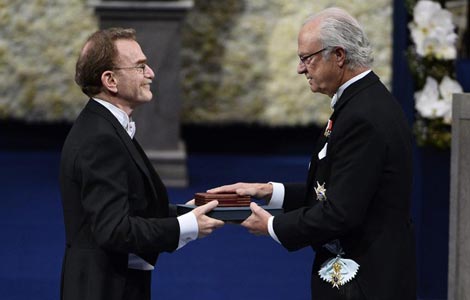
 2013 Nobel Prize award ceremony in Stockholm
2013 Nobel Prize award ceremony in Stockholm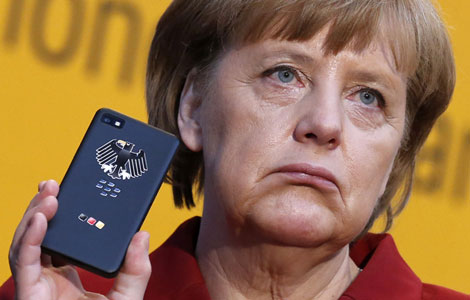
 Reuters images of the year - politics
Reuters images of the year - politics
 Conjoined babies waiting for surgery
Conjoined babies waiting for surgery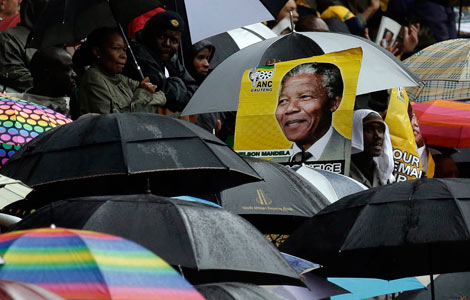
 Chinese say their goodbyes
Chinese say their goodbyes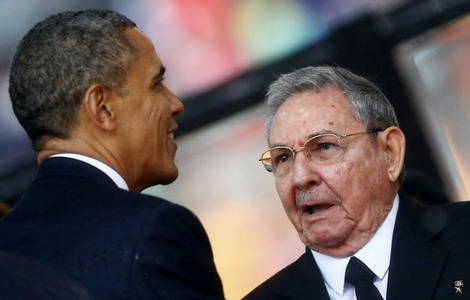
 Obama shakes hands with Cuban president Castro
Obama shakes hands with Cuban president Castro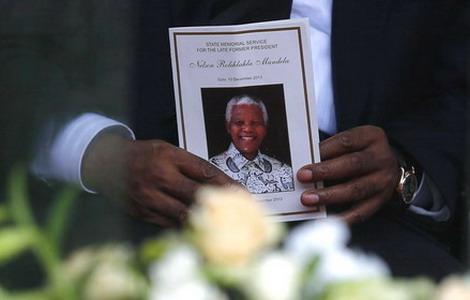
 S Africa holds memorial service for Mandela
S Africa holds memorial service for Mandela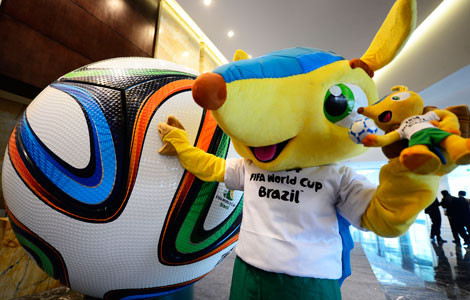
 World Cup mascot makes China debut
World Cup mascot makes China debut
Most Viewed
Editor's Picks

|

|

|

|

|

|
Today's Top News
US Congress negotiators reach budget deal
Retirees saddled with kids' costs
Bar lowered for private pilots
Building impact reports will be released
Obama urges Congress to pass budget deal
Beijing announces theme, priorities of APEC
Battle against counterfeit goods enters a new phase
Chinese say their goodbyes to Mandela
US Weekly

|

|
